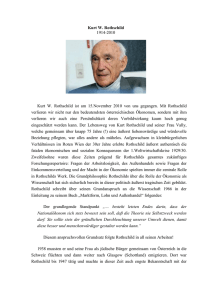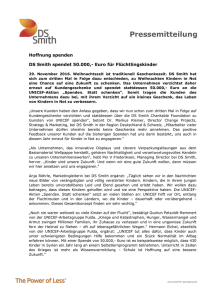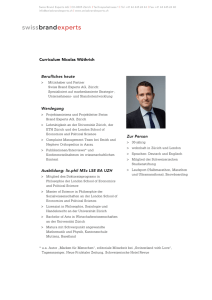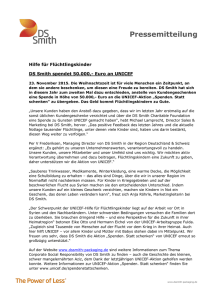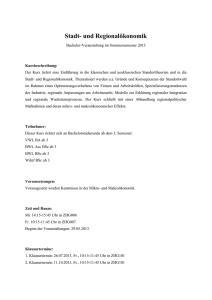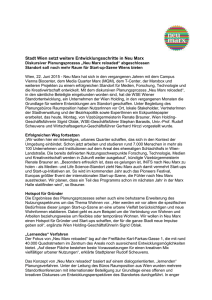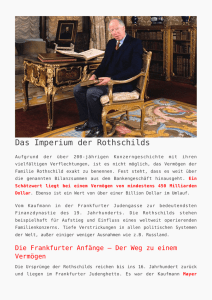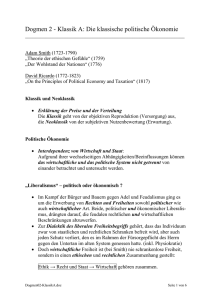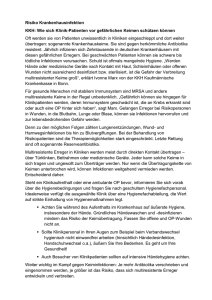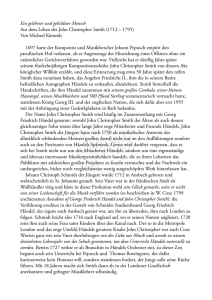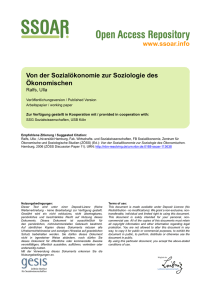Macht, ökonomische Theorie und Kurt W. Rothschild
Werbung
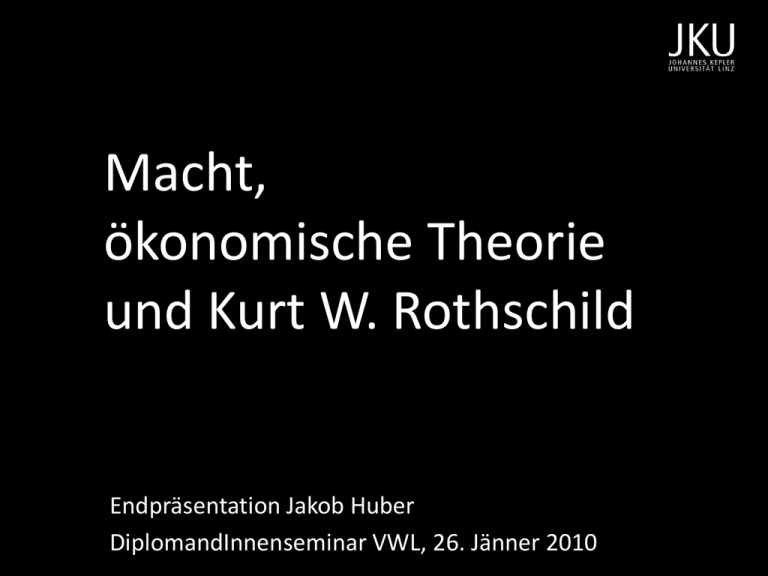
Macht, ökonomische Theorie und Kurt W. Rothschild Endpräsentation Jakob Huber DiplomandInnenseminar VWL, 26. Jänner 2010 Macht in der Geschichte ökonomischen Denkens Welche Rolle hat Macht im Denken über unterschiedliche Wirtschaftsordnungen gespielt? (1) „commercial society“ (18. Jhd.) → Land Adam Smith (2) „entrepreneural capitalism“ (19. Jhd.) → Kapital Karl Marx (3) „managerial capitalism“ (20. Jhd.) → Organisation John K. Galbraith Macht bei Adam Smith *1723 † 1790 Wealth of Nations (1776) (1) Permanenter Arbeitskampf, Meister behalten Oberhand (S.88) (2) Interessen der Gesellschaft konsistent mit jenen der LohnarbeiterInnen und LandbesitzerInnen, nicht aber mit jenen der KapitalistInnen. (S.323f) (3) Vermögen > Obrigkeit > Unterordnung > Regierung > Vermögen (S.875ff) (4) Symbiotische Unterordnung: Obrigkeit stützen, damit man vor Unteren geschützt wird. (S.881ff) Smith dachte nicht nur die „unsichtbare Hand“ des Marktes, sondern auch die „sichtbare Hand“ des gegenseitigen Zwangs. (Samuels) Macht bei Karl Marx *1814 † 1883 Das Kapital (1848) (1) Klassenstruktur + Konkurrenzmechanismus → Machtsystem zur Transformation & Reproduktion von Handlungs- und Verfügungsmacht. (2) Dialektik der Konkurrenz: (S. 402ff) I. KäuferIn ↔ KäuferInnen → Preis↑ II. VerkäuferIn ↔ VerkäuferInnen → Preis↓ III. KäuferInnen (Preis↓) ↔ VerkäuferInnen (Preis↑) Marktmacht gegenüber anderer Klasse (III) ist eine inverse Funktion der Konkurrenz innerhalb der Klasse (I&II) Neoklassische Stabilität folgt aus Annahmen über homo oeconomicus, bei Marx aus Annahmen über Machtstrukturen- und Mechanismen. (Palermo) Macht bei John K. Galbraith *1908 † 2006 New Industrial State (1967) (1) Technologie → große Organisation + Planung → Kontrolle über Einkauf und Absatz (S.47f) → Profit, solange er Sicherheit dient (S.180) (2) Technologische Anforderungen + Komplexität + Koordination → Macht wandert von KapitalistIn zu Technostruktur (S.78ff) (3) Anerkannter vs. revidierter Ablauf (S. 238) KonsumentIn Markt → → ← ← ProduzentIn (4) Gegenmacht als Pendant zur Konkurrenz: Monopolrenten sind Anreiz, Gegenmacht auf anderer Marktseite zu organisieren. (1952) Bimodale Ökonomie: Marktsystem existiert neben Planungssystem. Ökonomik betätigt Hebel, die mit keinen Maschinen verbunden sind. (Galbraith 1973) Conclusio und Ausblick (1) Rothschild: Macht ungerechtfertigterweise vernachlässigt. (Konzeptpräsentation, Kapitel II.1-3) (2) Politische Ökonomien als Machtsysteme interpretierbar. (Endpräsentation, Kapitel II.4) (3) Modell-Ökonomik und Macht: Mechanische (Max), Spieltheorie (MinMax), Rothschild (strategisch) (Kapitel III) „Economics, like other social sciences, cannot be a ‘hard’ science comparable to mechanics or other highly developed branches of natural sciences. The extreme complexity of the social world as well as its dynamics, the poor quality of empirical data, and the difficulties of experimenting make any attempt at reaching high levels of ‘exactness’ futile, if one aims at more than just the construction of ‘logical’ models. (...) Any hope to obtain a single, consistent theory which can provide a basis for all sorts of economic questions and explanations is simply ridiculous. Different theories and theoretical approaches (which do not need to harden into ‘schools’) are not a sign of weakness but the unavoidable expression of a multiparadigmatic attack on a ‘fuzzy’ and constantly changing subject matter which cannot be reduced to a single all-embracing theoretical framework. The real crisis in economics (if there is one) is a consequence of the hegemonic claims and the arrogance of the ruling neo-classical orthodoxy which tries to restrict the range of a ‘true economic science’ to the mechanistically inspired ‘exact’ approaches of equilibrium theory and its proliferations.(…) The way out, so it seems to me, should be a far more tolerant and open dialogue between theories (and disciplines) where quality and theoretical and practical relevance should count and not narrow rules about methodological niceties.“ Kurt W. Rothschild, „Glimpses on a non-linear biography“, 1990 Zentrale Literatur Kurt W. Rothschild Rothschild, K. W. (Hrsg.) Power in economics - selected readings. Harmondsworth: Penguin Books, 1971. Rothschild, K. W. 1991. "Glimpses on a non-linear Biography." Banca Nacionale del Lavoro Quarterly Review, 176, S. 3-13. Rothschild, K. W. 2002. "The absence of power in contemporary economic theory." Journal of Socio-Economics, 31(5), S. 433-42. Adam Smith Samuels, W. 1973. "Adam Smith and the Economy as a System of Power." Review of Social Economy, 31(2), S. 123. Smith, A. 2006 [1776]. Der Wohlstand der Nationen. Eine Untersuchung seiner Natur und seiner Ursachen. München: Finanzbuchverlag. Karl Marx Marx, K. und Engels, F. [1890] 1970. Das Kapital. Kritik der politischen Ökonomie. Band 1-3. Berlin: Dietz Verlag. Palermo, G. 2007. "The ontology of economic power in capitalism: mainstream economics and Marx." Cambridge Journal of Economics. John K. Galbraith Galbraith, J. K. 1954. "Countervailing power." The American Economic Review, 44(2), S. 1-6. Galbraith, J. K. [1967] 2007. The New Industrial State. Princeton: Princeton University Press. Galbraith, J. K. 1973. "Power and the useful economist." The American Economic Review, S. 1-11. Macht und Marktmodelle Palermo, G. 2005 "Misconceptions of Power: From Alchian and Demsetz to Bowles and Gintis." Discussion Paper 05/10, Dipartimento di Scienze Economiche Università di Brescia Morgenstern, O. 1972. "Spieltheorie als allgemeine Theorie des Machtkonfliktes," In Macht und ökonomisches Gesetz, ed. Schneider, H. K. und Watrin, C., 385-402. Bonn: Duncker & Humboldt. Rothschild, K. W. 1947. "Price Theory and Oligopoly." The Economic Journal, 57(227), S. 299-320.
